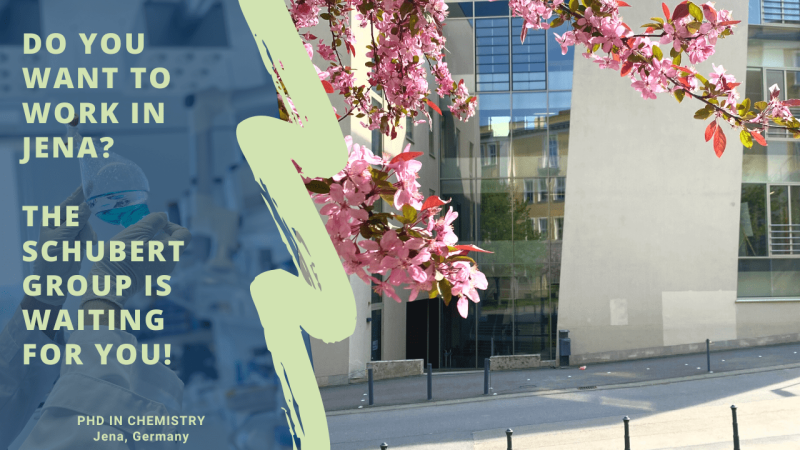
Multiple PhD and Postdoc Positions
At the newly founded research group at the University of Jena, led by Kevin Maik Jablonka
We are looking for highly motivated Ph.D. students and postdocs for projects at the intersection of machine learning and chemistry and material science (digital chemistry), with a focus on data-driven design of polymer materials for energy applications. We will have multiple fully funded positions starting in summer/fall 2023. Together, we will create impactful methods for accelerated material discovery across scales—ultimately helping us identify materials that work in the real world while also
increasing understanding of why those materials work.
Background
The design and discovery of new molecules and materials is slow. A major reason for that
is that our research approach often relies on trial-and-error and is bottlenecked by
information transfer: We would greatly benefit from having all information as well as
intuition of all chemists at our fingertips. Machine learning can help us democratize access
to this expert knowledge and help us navigate high-dimensional design spaces.
In our lab will develop data-driven strategies for designing materials that work in the real
world around three main research pillars: 1) Novel inductive biases (including “soft”
inductive biases via LLMs), 2) Human-in-the-loop active learning, and 3) Novel learning
paradigms. We will develop robust open-source software and also contribute to
international research data initiatives. The PostDoc position will have a focus on this
research data management aspect and the use of novel tools (such as LLMs) in this
context.
Due to their unique tunability (and the correspondingly large design space) and
functionality, we will focus on polymers, where we will closely collaborate with worldleading
experimental partners to validate our predictions and build novel modeling and
data frameworks.
For more background on Kevin’s thinking see his websiteExternal link and publicationsExternal link, you can
contact him via email or TwitterExternal link.
Your Profile
- A Master's degree or a four- or five-year Bachelor's degree in Chemistry, Chemical
Engineering, Computer Science, Mathematics, Physics, or related fields. For the
PostDoc positions, a Ph.D. is required for employment). - Motivation for working on challenging projects, passion for scientific research, and
thrive for excellence. - Strong teamwork and communication skills.
- Growth mindset and inclusive team culture.
- Excellent written and oral communication skills in English.
- Ideally, programming and machine learning experience (e.g., in Python, Julia).
We Offer
- Be part of the story from the beginning when we start up an ambitious research
program on digitizing chemistry and materials science. - Become part of an international and interdisciplinary research group within a
scientific network that offers research and infrastructure at the highest level. We
collaborate with world-leading experimental groups in Jena as well as the
Helmholtz Center in Berlin that have access to unique high-throughput
experimentation as well as characterization setups. - Participate in international and national conferences, summer schools, and
workshops (we have allocated a significant amount of resources for travel). - Besides excellent in-house computational infrastructure (you will have multiple
A100 cards waiting for you), Kevin is co-leading the ChemNLP project, for which we
have access to resources from Stability.ai - Become part of a research group that cares about your personal development: We
will create tailored personal development plans, that we review every year. - A family-friendly working environment with a variety of offers for families: University
Family Office (JUniFamilie) and flexible childcare (JUniKinder). - University health promotion and a wide range of university sports activities.
- Attractive fringe benefits, e.g., capital formation benefits (VL) and an occupational pension (VBL)
- 30 days of recreational leave in the calendar year plus one day off for Dec. 24 and
Dec. 31 that should be taken without any guilt.
Application Process
- 1. Send a CV and a summary (max. 1 page) of your research interest (and past research)
to join@lamalab.org with the subject "PhD in Digital Chemistry” or “Postdoc in
Digital Chemistry”. Please highlight why you would like to join our group. If you
would first like to learn more, reach out to Kevin (mail@kjablonka.com). - 2. Selected candidates will be invited first to a non-technical discussion and then in a
second round of a technical interview (including a ~25 minutes presentation).
Candidates with disabilities will be given preference in the case of equal qualifications
and suitability.
We will provide support for visa applications and any other potential relocation issues.
We will also support fellowship applications if you would prefer joining the lab on your
own funding. Contact Kevin for more details on suitable fellowships.
Diversity and Equality
At the Friedrich Schiller University (FSU) people from a wide range of (cultural and
academic) backgrounds study and work together. At FSU, and in particular in our group,
we see diversity as a strength and key for our success. We rely on different ways of
thinking to create the most impactful research.
Our group will be a place in which everyone—-irrespective of the background feels save
and will be successful.
Doing a Ph. D. at the Fiedrich Schiller University of Jena
The Friedrich Schiller University is a traditional university with a strong research profile
rooted in Jena, at the heart of Germany. Since its foundation, it has been one of
Germany's most famous places to study, where outstanding academics like Goethe and
Schiller left their marks. As a university covering all disciplines, it offers a wide range of
subjects. Its research is focused on the areas Light—Life—Liberty. It is closely networked
with non-research institutions, research companies (links going back to Carl Zeiss, Otto
Schott, and Ernst Abbe) and renowned cultural institutions. With around 18,000 students
and more than 8,600 employees, the university plays a major role in shaping Jena’s
character as a cosmopolitan and future-oriented city (of around ~100 000 inhabitants).
Germany is a beautiful and safe country with great work-life balance and life satisfaction.
You will receive a very competitive salary with which you will live comfortably and save
money for leisure activities.
Your workplace
Our lab (CZS Research group "Polymers for energy applications” ) will be located in the
newly constructed Center of Energy and Environmental Chemistry Jena II at the
Landgrafencampus (close to one of the best viewpoints of the city), where four new
buildings with ca. 7500 m² lab space have been built over the last 10 years.
Frequently, start-companies involving Ph.D. students and Postdocs are created, and a
new incubator for chemistry related start-ups is currently built next to the campus.
Junior research group leader
starting for the next possible date.
Full-time (40 hours per week) according to TV-L E 14 for a limited period (until 30.06.2026).
The main focus of the research of the junior research group should be on the topic of sustainable polymer research or automated chemical research with a focus on polymers, whereby one of the following three thematic priorities should also be addressed:
1. Modern polymer synthesis, processing and application
2. Sustainable polymeric materials
3. New materials for energy applications
The junior research group to be established should conduct research in at least one of these areas. More information on the individual thematic priorities can be found at www.ceec.uni-jena.de.
Your responsibilities:
- Independent leadership of a junior research group in the field of polymers chemistry and independent research in the field of sustainable polymers or automated polymer research
- Independent supervision of doctoral, master's and bachelor's students
- Close cooperation with industrial partners such as Altana AG and cooperation partners at the Friedrich Schiller University in Jena
- Publication of scientific results and, if necessary, acquisition of own third-party funds
Your profile
- Successfully completed university studies and a very good doctorate in chemistry (preferably in the field of macromolecular chemistry), materials science or equivalent
- General computer skills, including Windows and Office
- Very good knowledge of spoken and written English
- The ability to work in an interdisciplinary, international team is required
- We expect a high degree of motivation, initiative and the willingness to familiarize yourself with a wide range of tasks
We offer
- Management of an independent junior research group in an exciting and forward-looking research topic
- A research environment that is supplemented by a wide range of cooperation opportunities, especially with industrial partners in and around Jena as well as with Altana AG and within the Friedrich Schiller University Jena
- Unique team of scientists and engineers
- Attractive fringe benefits, e.g., capital-forming benefits, job ticket (discounts for public transport), company pension scheme (VBL)
- An exciting field of activity with creative freedom
- Opportunity for habilitation is given
- University health promotion and a family-friendly working environment with flexible working hours
- Remuneration according to the provisions of the collective agreement for the public service of the federal states (TV-L) according to the personal requirements up to salary group 14
The position is initially limited to three years. This is a 100% full-time position (40 hours/week).
The University of Jena strives for a higher proportion of women in science; therefore, we strongly encourage qualified female scientists to apply.
Severely disabled people will be given preference if they have the same suitability, ability and professional qualifications.
If your research focuses very well on the outlined subject areas, then please provide a short description of your research in this context, naming one of the specific thematic focuses (length of approx. 1-2 pages) as well as meaningful documents about yourself (curriculum vitae in tabular form, certificates in copies, list of publications, etc.) by 30.06.2023 to:
Friedrich-Schiller-Universität Jena
Chemisch-Geowissenschaftliche Fakultät
Herr Prof. Dr. Ulrich S. Schubert
Philosophenweg 7a
07743 Jena
oder per Email an: ceec-jena@uni-jena.de
For further information for applicants, please refer to https://www.uni-jena.de/en/job-market
Unsolicited applications
First of all you need to be sure of the subject and the topic you apply for. The Schubert group regularly posts job openings on the website. Other than checking the posts, we advise you to go through our website to check our research topics, the methods and instruments we use, as well as the cooperation we participate in and the papers published in the recent years.
Note that you do not have to meet a certain deadline for your application (unless stated otherwise). However you do need to send in your curriculum vitae together with a motivation letter to inform us about your background, motives, what your input will be to the group and what you want to pursue in your career. Please also include reference letters from your supervisor(s).
After we receive your application, your qualifications and skills will be evaluated by different members of the working group. You may be invited to visit our group to give a short presentation about your previous studies and to discuss about any job possibilities, as well as to be presented a clear picture of the opportunities we provide our members with, as per technology and science, and to be introduced to the group members.
For applicants from outside EU who need to have a valid visa to enter Germany, we also prepare an invitation letter to be used at the consulate to expedite the visa procedure.
Schubert group grants scholarships or positions on industrial projects to all PhD students. For this purpose, we are keeping close contact and taking part in cooperation with institutes and companies, which seek successful research studies in Organic and Macromolecular Chemistry and Nanoscience.
Humboldtstraße 10
07743 Jena
